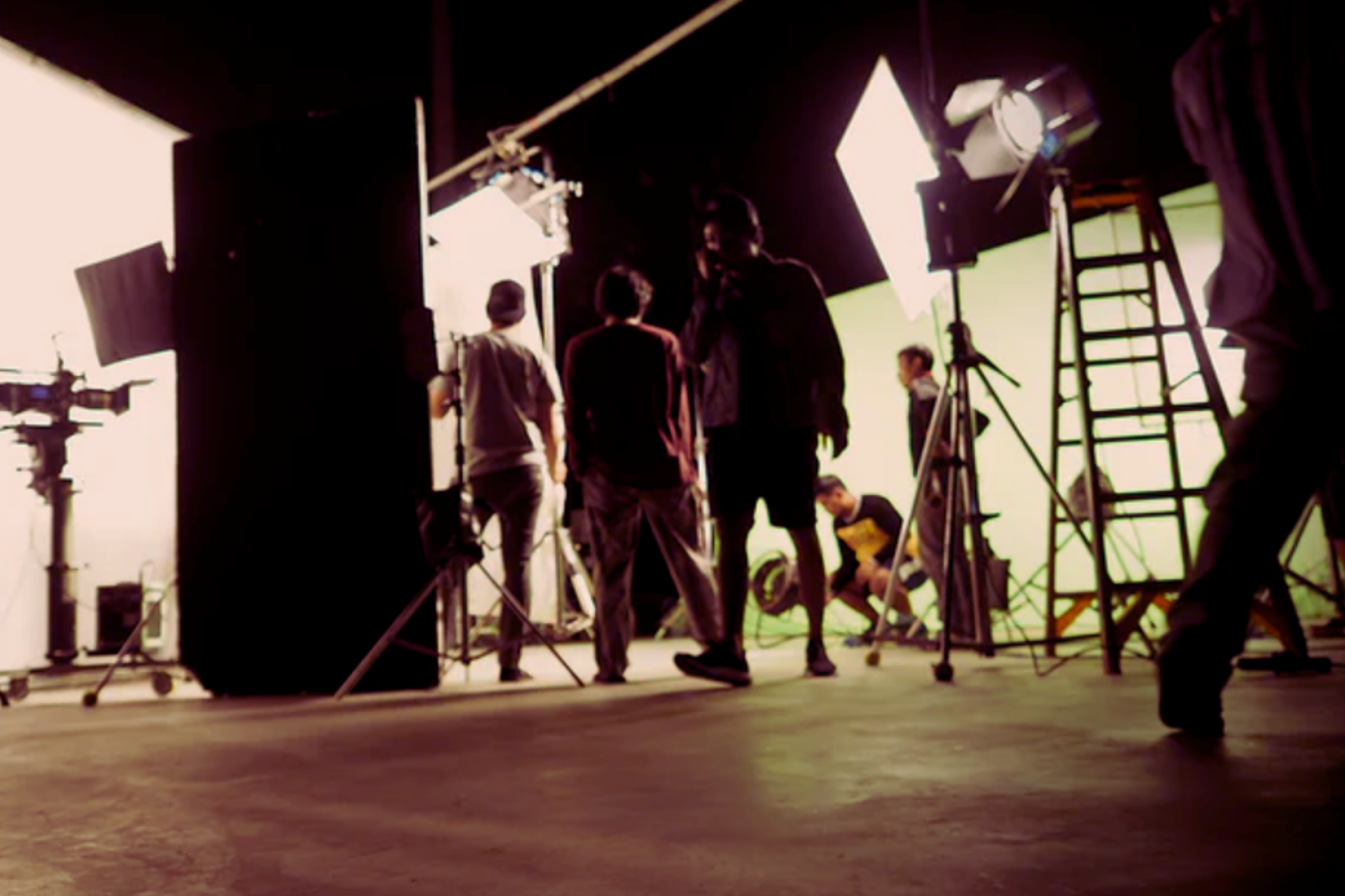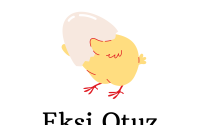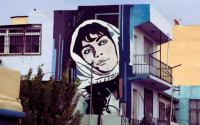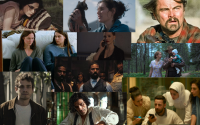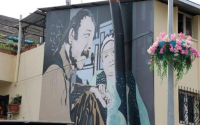Eksi Otuz'da Bihter Çetinyol, sinemacı Ayşe Mutlusen ile bir vakıf üniversitesinde sinema okuma deneyimini, setteki mücadeleleri ve sektörde yaratıcı üretime başlama yolları üzerine konuşurken; festivallerin, platformların ve sinema salonlarının genç sinemacılara ve öğrencilere gerçekte ne kadar destek olabildiğini sorguluyor ve bu alanların daha ulaşılabilir olmasını tartışıyor.
Scroll down for the English version.
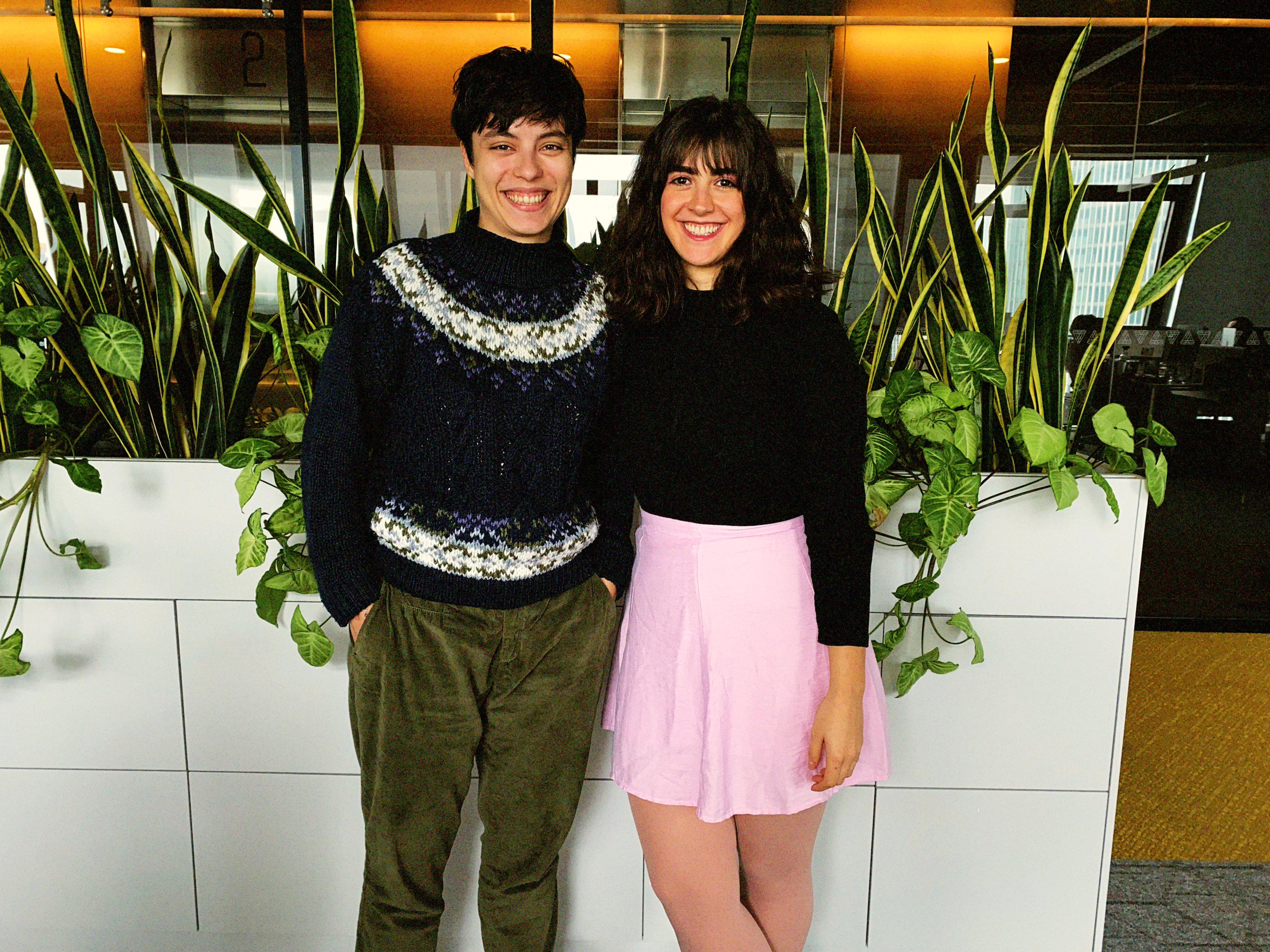
BihterÇetinyol: Bizi dinleyen herkese hoş geldiniz demek istiyorum. Ben Bihter. Eksi Otuz'u dinliyorsunuz ve bugün sevgili Ayşe Mutlusen ile beraberiz. Öncelikle Ayşe çok teşekkür ederim bu güzel şarkı seçimi için. Ve bugün aramıza hoş geldin.
Ayşe Mutlusen: Merhaba.
BihterÇetinyol: Merhabalar. Ayşe, Kadir Has Üniversitesi radyo-televizyon sinema mezunu. Bir sinemacı ve sinemayla ilgilenen, ekranın her tarafında yer almış iyi bir dostum. Aynı zamanda iş arkadaşım. Beni kırmayıp buraya geldiği için tekrardan çok teşekkür ediyorum. Çünkü benim için zordu programı kurgulamak ve burada konuşmak ve Ayşe genellikle çok güzel beraber konuştuğumuz bir insan. O yüzden hepinizin keyif alacağını düşünüyorum.
Ayşe Mutlusen: Evet, merhaba. Ben teşekkür ederim sana beni davet ettiğin için. Ayrıca programını da zaten çok değerli buluyorum. Şundan dolayı, biz genelde hep böyle işte alanında başarılı olmuş insanları zaten hem ilham almak için hem hikayelerini dinlemek için çok dinliyoruz. Ve o da genelde zaten başarıya ulaşmış insanların geçmiş hikayeleri oluyor. Ama zaten bu yoldan geçen insanlar olarak halihazırdaki dertlerimizi anlatabildiğimiz alanlar az. Böyle bir alan yarattığın için teşekkürler.
Bihter Çetinyol: Rica ederim. Hemen konuya giriyorum.
Ayşe Mutlusen: Tamam, girelim.
Bihter Çetinyol: Kadir Has mezunu olduğun için ve Kadir Has'ın da aslında Türkiye'nin şu anki sinema sektöründe hem yetiştirici hem de iyi bir eğitim kurumu olarak aslında öne çıktığını son zamanlarda çoğu insan konuşuyor. Ben birebir de deneyimlememiş olarak yine de bundan haberdarım. Dolayısıyla aslında şunu sorarak sana başlamak istiyorum. Bu üniversitede okumak .senin sinema sektörüne girişinde veya bir sinemacı olarak kariyerinde nasıl bir fark yarattı? Ya da yarattı mı?
Ayşe Mutlusen: Yarattı diyebilirim tabii ki. Çünkü dediğin gibi, Kadir Has bu alanda iyi bir okul. Dolayısıyla derslere çok girmeyeceğim ya da hocalar, akademik kadrosu zaten iyi. O konuda ufuk açıcı şeyler gördük. Ama onun dışında benim bireysel yolculuğumda, iş bulma konusunda ya da benim kendi filmlerimi yapma konusunda bana desteği de oldu. Mezun olmadan önce çalışmaya başladım ben halen okuldayken. Orada öğretim görevlisi birinden ilk işimi bulmuştum. Daha sonra dışarıdan gelen yönetmen hocalarımız var, yapımcı hocalarımız var. Onlarla böyle bir network oluşturma gibi bir durum oluyor. O şekilde iş bulma olanaklarımız oluyordu. Yani bunu iyi kullandığın takdirde tabii ki.
Bihter Çetinyol: İyi network bir sağlıyordu yani.
Ayşe Mutlusen: Evet, sağlıyor. Ama dediğim gibi iyi kullanmak gerekiyor, iyi bilmek gerekiyor, birazcık gözü açık olmak gerekiyor. Onun dışında zaten okulda dersler için kısa filmler çekiyoruz, çekmemiz gerekiyor. Bunun için ekipman sağlaması ya da kurgu yapabileceğimiz bir yer vesaire bu gibi alanları da var. Tabii ki pratikte bir şeyleri yapmak, dersi dinlemekten daha zor oluyor. Yani uygulamaya geçtiğin zaman birazcık daha zor ve bilmediğin bir şey olduğu için zorlandığımız alanlar ya da eksik kalan alanlar oluyor tabii ki. Ama bunlar zamanla gelişecek şeylerdir diye düşünüyorum.
Bihter Çetinyol: Peki, film sektörü aynı zamanda prodükte etmek anlamında maliyetli de bir iş. Okulun size bir fon ya da bir maddi yardım sağladığı oldu mu?
Ayşe Mutlusen: Oldu. Yine bireysel bahsedeceğim. Benim son senemde bir kısa film senaryosu yazmıştım. Bu derslerden bağımsız bir şeydi. Tamamen kendi isteğimle yaptım ve daha sonra festivallere göndermek istediğim bir filmdi. Bunun için o sene ilk defa sanırım faaliyete geçmişlerdi. Yaratıcı Endüstriler Platformu diye bir platform kurulmuştu ve o aslında her bölümden öğrencinin her projesine açık bir platformdu. Ben de kısa film projemle gitmiştim ve bir bütçe çıkarmıştım tabii ki. Ve bunun sunumunu yapmıştım. Jüri üyeleri oluyordu okuldaki hocalardan, farklı bölümlerden. Benim de yaptığım sunum sonucunda bana bir fon sağlamışlardı ve ben o fon sayesinde kısa filmimi çekebilmiştim. Sonra onun yolculuğu başladı. İşte festivallere yolladım vesaire. O şekilde bir desteği olmuştu.
Bihter Çetinyol: Anladım ama bölüm bazında aslında sizin bölümün ayrıca sağladığı bir maddi destek aslında çok fazla yok. Yani çok spesifik prodüksiyon bazlı giderleri karşılayabileceğiniz direkt bir fon da aslında yok diyorsun.
Ayşe Mutlusen: Yok, yani benim dönemimde yoktu. Kendimizin sağlayacağı şeylerdi. Dediğim gibi ekipman bulabiliyorduk okulda. Ama onun dışında tabii bir sürü maliyeti oluyor filmin. Her ne kadar kısa ve öğrenci filmi çekiyor olsan da…
Bihter Çetinyol: Auteur yönetmen olmadığın zaman böyle şeyler yaşanabiliyor.
Ayşe Mutlusen: Yaşanıyor, evet.
Bihter Çetinyol: Peki sonra setten bahsettin yani sette bir iş imkanı sağladığından bahsettin. Set hayatı senin için nasıl geçti?
Ayşe Mutlusen: Set hayatı, yani iyi tarafları da vardı, kötü tarafları da vardı. Şu anda çalışmıyorum zaten, bırakalı da oldu. İşte reklam, dizi, film... Bu tarz setlerde çalıştım. Zor, şu bakımdan zor, özellikle bir sinema öğrencisi olarak okuldan çıkıp sete girdiğin zaman, yani sahaya girdiğin zaman zorlanıyorsun çünkü okulda gördüğümüz müfredatta öyle bir şey yok. Mesela bazı yurt dışındaki bazı okullar, hangileri olduğunu bilmiyorum ama kendi fakülteleri içerisinde mesela görüntü yönetmenliği ayrı dalı oluyor ya da işte sanat yönetmenliği ayrı dalı oluyor. Ve sen orada aslında az çok ne yapmak istediğini bilerek gidip, daha spesifik olarak onun eğitimini gördüğün zamanlar oluyor. Bu bizde ders ders oluyor bazen ama bunlar uygulamalı olmuyor çok. Dolayısıyla sahaya girdiğin zaman bambaşka bir dünyayla karşılaşıyorsun. Orada genelde zaten alt kategorilerden başlıyorsun. İşte reji asistanlığı, kamera asistanlığı, set asistanlığı gibi.
Bihter Çetinyol: Besin zincirinin en altından başlıyorsun.
Ayşe Mutlusen: Aynen, en altından başlayıp en yukarı doğru çıkmayı hedeflediğin bir yer orası aslında. Şey açısından güzel tabii ki, nerede ne yapılıyor? Yani bu filmler nasıl çekiliyor? Bunları görmek, okulda tabii ki backstage izliyoruz. Ama onu deneyimlemek başka bir şey. Onun bana kattıkları var tabii ki ama zor. O başka bir konu; sektörel gelişimler başka bir programın konusu.
Bihter Çetinyol: Aynen başka bir programın konusu.
Ayşe Mutlusen: Mesela on iki saat çalışmak zorunda mıyız? İşte bir gün mü boşluk olmak zorunda falan gibi bir sürü konu var. Ama dediğim gibi, prodüksiyonla, sahayla okul farklı. Çok farklı.
Bihter Çetinyol: O noktada şunu da merak ettim şimdi birden. Bahsettiğin hocaların mutlaka aslında sektörde de yer alan profesyonellerdir. Aynı zamanda sadece akademisyen değillerdir.
Ayşe Mutlusen: Olanlar var, evet.
Bihter Çetinyol: Bu kişiler sizi setlere götürüp o setlerde bir şekilde bir şeyleri öğrenmenizi de ayrıca sağladılar mı? Yoksa siz sadece mezun oldunuz ve bir anda okyanusa mı daldınız?
Ayşe Mutlusen: Bir kere yaşadık bunu. Hayk (Kirakosyan) Hoca ile birlikte. Görüntü yönetmeni. O bizi götürmüştü bir sete. Ve hatta orası komikti, set çalışanlarıyla işte biz okullu olduğumuz için böyle bir dalga konusu falan olmuştu.
Bihter Çetinyol: Böyle bir şey de var değil mi?
Ayşe Mutlusen: Evet çünkü sette çalışanların herhalde yani bilmiyorum tabii de çoğunluğu alaylı olarak yetişiyor setlerde.
Bihter Çetinyol: Sen de okullusun.
Ayşe Mutlusen: Aynen ben de okulluydum öyle bir şey olmuştu, bir de zaten küçüğüz yani.
Bihter Çetinyol: Tabii gençsin.
Ayşe Mutlusen: Aynen, genciz. Ama olmuştu, bir kere gitmiştik yani. Onu görmek de güzeldi okul zamanında tabii.
Bihter Çetinyol: Çok güzel. Okullar aynı zamanda bittikten sonra da iyi topluluk mekanları olmaya devam ediyorlar. Özellikle Türkiye'deki daha doğrusu sadece Türkiye'deki değil de dünyanın birçok yerindeki köklü üniversiteler mezuniyet sonrasında da mezunlarını bir arada tutmak ve daha sonrasında yetişen insanları o mezunlarla tanıştırarak iyi bir kültür havuzu inşa etmeye çabalıyorlar aslında ki bence bu çok değerli. Kendi üniversitem için de aynısını söyleyebilirim, Mimar Sinan için. Burada aslında okulun çok önemli bir varoluşu var. Ama aynı zamanda Türkiye'de sinema sektörü birçok derneğin, birçok birliğin veya birçok topluluğun da aslında bir arada olduğu, gerçekten sıkı sıkıya çalıştığı bir sektör, sinema sektörü. O yüzden şunu aslında merak ettim. Hem okul, hem o dernekler ya da işte birlikler mezuniyet sonrasında sinemacıların sektöre kazandırılması için ekstradan bir yardım ya da bir alan açıyorlar mı sizlere?
Ayşe Mutlusen: Yani çok açıldığını söyleyemem herhalde. Şundan dolayı söyleyemem. Yani tabii ki de açılıyor. Yeni insanlar sektöre kazandırılmaya çalışılıyor, ki zaten dediğim gibi asistan olarak başladığın için zaten genç insan havuzundan toplanıyor o insanlar.
Bihter Çetinyol: Ama bu biraz yani fabrikada çalışan minik Çinli işçilere benziyor gibi hissediyorum. Çünkü ucuz iş gücü üzerinden aslında sizi davet ediyorlar.
Ayşe Mutlusen: Evet, tabii ki yani…
Bihter Çetinyol: Yaratıcı bir üretimi devam ettirelim. Ah burada parlayan bir cevher var… (gibi değil).
Ayşe Mutlusen: Ya evet, evet tabii ki yani. Benim öyle tanıştığım çok yapımcı oldu bana. kaşemi düşürmek için her türlü taklayı atan insanlar. Sırf öğrenci olduğum için. O var tabii ki ama herhalde yani konuştuğumuz şey birazcık daha böyle direkt gençler özelinde spesifik yapılan şeyler herhalde. Onlar da az diye düşünüyorum. En azından benim çok karşılaştığım yok öyle bir şey. Birazcık şey gibi oluyor yani sen mezunsun, mezun oldun ve bomboş bir alanın içindesin.
Bihter Çetinyol: Yönlendirme yok.
Ayşe Mutlusen: Yok. Kendi çabanla yapman gereken şey. Bu tabii ki normal. Her alanda bunu yapmak gerekiyor. Ama biraz daha dediğim gibi belki üniversitede gerçekten bu işte çalışacak insanlar için belki daha farklı yöntemler olmalı onları tanıtmak için. O sektöre sokmak için. Belki mezun olduktan sonra birlikler oluşturulmalı. Ya da ne bileyim böyle gençlerin bir araya gelebileceği topluluklar daha fazla olmalı belki diye düşünüyorum. Çünkü yani mezun olduktan sonra ne iş yapacağım diye düşünürken zaten... Yıllar geçiyor.
Bihter Çetinyol: Bir bakıyorsun otuz oluyorsun.
Ayşe Mutlusen: Evet. Yani çoğumuz zaten bambaşka işler yaparken buluyoruz kendimizi. Çünkü geçinmek zorundayız. Yani bir anda kimse auteur bir yönetmen olamıyor. Bir anda kimse iyi kazanan bir oyuncu olamıyor.
Bihter Çetinyol: Yani annenden doğduğun ertesi günü A blok B blok çekemiyorsun sonuçta.
Ayşe Mutlusen: Evet, çekemiyorsun. Birazcık gerçekten çaba gerektiriyor, sabır gerektiriyor. Yani ne yapacağım diye düşünürken dediğin gibi zaman geçiyor ama tabii ki bir yolunu da buluyorsun bir şekilde.
Bihter Çetinyol: Aklıma “kürsü düşüyor” olayı geldi… (gülüşmeler). Ama bu bahsettiğim birlikler sadece insanlar birbirlerini tanısınlar, sevsinler gibi değil de aslında belirli kurumların buradaki maliyeti de üstlenmesini gerektiriyor. Belirli fonlar açması, o yönlendirmeleri de yapmasını gerektiriyor. Bunu yapan aslında yerler var. Bağımsız inisiyatifler genellikle Avrupa Birliği fonuyla hareket eden veya bazı özel inisiyatiflerin adımlarıyla beraber bunu yapanlar var.
Ama yine de günün sonunda insan şunu merak ediyor. Tamam okulu konuştuk, seti de konuştuk ama film sektörünün çok önemli bir kısmı daha var, o da aslında gerçekten o sıcak paranın döndüğü festivaller, sinema salonları ve artık günümüzün vazgeçilmezi haline gelen dijital platformlar. Dolayısıyla insan şunu sormadan edemiyor. Yani tamam, okul bir şekilde destek sağlıyor veya sağlayamıyor. Çünkü Kadir Has sonuçta bir vakıf üniversitesi olduğu için diğer okullara göre daha da avantajlı. Belki bunu Anadolu'daki bir devlet üniversitesinde bu kadar kolay elde edemezsin. Ama günün sonunda belirli festivaller, işte İstanbul'un çok meşhur bir film festivali var, adını veremeyeceğim, veya başka festivaller var, bir armut festivali var. Reklam vermemek için çok uğraşıyorum şu an. Dolayısıyla bu festivallerin, bu platformların içinde dönen paralar günün sonunda gerçekten bir şeyler üretmek isteyen, o yaratıcı üretimi yaratmak isteyen gençlere alan açıyor mu, bunu görüyor musun? Çünkü belki de bizim bir araya geldiğimiz inisiyatiflerdense bu festivallerin, işte salonların veya platformların da aslında destek vermesi iyi olabilir diye düşünüyorum.
Ayşe Mutlusen: Bence de çok haklısın. Dediğin gibi bunu yapanlar var. Böyle yerler var. Fon oluşturan ya da yarışma düzenleyen, destek sağlayan yerler var. İşte senaryonla gittiğin, ilk filmini çekiyorsan sana para verilen yerler var. Tabii ki bunlar yarışma. Ama yetersiz. Yani daha fazla olması gerekiyor. Çünkü yani ben de tam olarak böyle sayı olarak ya da istatistik olarak bir şey söyleyecek bir uzmanlıkta değilim ama benim gördüğüm ve bu yolda olan bir insan olarak bunlar az ve ulaşılması zor yerler. Yani her ne kadar biz bağımsız sinemadan bahsediyor olsak da bunu vurgulamamın sebebi aslında ana akım medyaya göre çok daha küçük bir alan olması. Burada olsak da yine de bu alanlarda bile bir şeylere ulaşmak zor. Ve gittikçe de zorlaşıyor gibi hissediyorum. Çünkü şöyle şeyler var, gerçekten çok iyi fikirler havada uçuşuyor olabilir. Çok iyi senaryolar, işte çok iyi topluluklar, iyi film fikirleri, bunlar oluyor olabilir ama bunları götürebileceğin bir alan bulmaya çalışıyorsun sürekli. Yani elinde senaryo, ben bunu nereye götürsem de kabul ederler diye bir vaziyette buluyorsun kendini. Çünkü bu da belki başka bir programın konusu ama burada bir şey de var; “biz ne kadar bağımsız işler yapabiliyoruz?” yoksa ne kadar “seyirci ne istiyor onu mu veriyoruz” işleri. Çünkü bunun sayısı çok fazlalaştı günümüzde. Dolayısıyla belki gerçekten daha fazla alana ihtiyacımız var. Özellikle yeni yola çıkmış ve yeni bir şeyler üretmek isteyen insanlar için.
Bihter Çetinyol: Anladım. Senin festival deneyimin oldu mu? Ya da bir film gerçekten çekme, başından sonuna bunu dağıtmaya çalışma, paylaşma deneyimin oldu mu? Bunu da merak ediyorum.
Ayşe Mutlusen: Oldu. Yani bunu iki kısa filmimde yaptım. Festivallere yolladım. Bir tanesinin yolu daha açık oldu. Çünkü o gerçekten kısa ve böyle hap gibi bir filmdi. O birkaç festivale girdi. Diğer kısa filmim, o böyle 30 dakikalık uzun bir filmdi aslında ve bu arada 30 dakika olduğu için Türkiye'de hiçbir festivale yollayamadım. Çünkü bir süre kısıtlaması vardı. Yurtdışındaki festivallerde bu süre daha uzundu ki bunu festivallere tek tek şikayet olarak mail atmıştım. Ama hiçbirisi dönmedi. Bunlar kısa filmler.
Biz altı arkadaş olarak üniversiteden bir kolektif oluşturduk. Hala da birlikte çalışıyoruz. İsmimiz 21. Biz bir uzun metraj çektik. O uzun metrajın da bir aslında festival yolculuğu oldu. Fakat şöyle, birazcık kısaca filmden bahsedeceğim aslında. Filmimizin ismi Aynı İpte Asılı. Bu filme biz tam olarak aslında bu bahsettiğimiz şeylerden yola çıkarak, biz yeni mezun olmuştuk ve tam da pandemi dönemiydi bu arada. Ve şeydik böyle bir şeyler üretmek istiyoruz.
Bihter Çetinyol: Yanıyorsunuz!
Ayşe Mutlusen: Aynen evet yani.
Bihter Çetinyol: Üretimin aşkıyla yanıyorsunuz!
Ayşe Mutlusen: Evet ve ne yapabiliriz diye düşünürken böyle farklı bir şeyler deneme isteğimiz de vardı. Ve yönetmenimiz Barış Demirdelen, o da bir gün bir fikirle geldi ve biz üç günlük doğaçlama, tamamen senaryosuz bir film çektik evde. Kamera kiraladık.
Bihter Çetinyol: Bütçesi nasıl oldu?
Ayşe Mutlusen: Bütçesi şöyle oldu, biz hepimiz cebimizden birazcık para çıkardık.
Bihter Çetinyol: “Abi bende on lira var ama”.
Ayşe Mutlusen: Gerçekten böyleydi bu arada (gülüşmeler). Yani çok düşük bütçeli bir film. Gerçekten sadece neye ihtiyacımız varsa ona para verdiğimiz gibi. Ama tabii ki içimizde de böyle, bir inanç var iyi bir şey yaptığımıza dair. Daha sonra bu filmin post prodüksiyon süreci birazcık uzun sürdü. Bu filmi bitirdik. Daha sonrasında dedik ki bu güzel bir film ve biz bunu bir yerlere gönderelim. Yani çünkü bu böyle üretimlerde nihai amaç onu insanlara ulaştırmak.
Dolayısıyla bir festival sürecine girdik. Biz post prodüksiyon desteği almak için bir festivale yollamıştık. Fakat festival jürileri kabul etmediler. Fakat o jüride Ceylan Özgün Özçelik vardı. Kendisi de günümüzün çok değerli yönetmenlerinden biri. Ve bizi görüp mesela, siz ilginç bir iş yapmışsınız. Ben bu filmi beğendim ve ben size destek olmak istiyorum dedi. Ve ondan sonra gerçekten bizim için bir şeyler güzelleşti. Dünyamız güzelleşti. Daha sonra bu filmin gösterimini yapabildik sinemada. Sonra bir dijital platformda yayına çıktı. Bir sene kadar kaldı. Böyle oldu aslında o filmin de festival süreci.
Bihter Çetinyol: Buradaki festival jürileri genellikle her zaman belki de aynı vakti ayıramıyor olabilirler filmlere. Böyle bir şey olduğunu düşünüyor musun? Belki bununla ilgili bir deneyimin vardır.
Ayşe Mutlusen: Yani bununla ilgili, tam olarak bununla ilgili bir deneyimim var. Yani şöyle, ben İstanbul'daki o meşhur film festivalinde çalışırken Uluslararası Jüri Asistanlığı yapıyordum ve Uluslararası Jüri ile beraber film seçkisindeki bütün filmlere beraber gittik. Ben onları götürüyordum, izliyorduk. Ve bir yerli filmde önümde uluslararası jüri, arkamda ulusal jüri oturuyordu. Ve ben ulusal jürinin film ortasında kalkıp gittiğini, gülüştüğünü, konuştuğunu, yani asla hiçbir şekilde filme dikkat kesilmediklerini kendi gözlerim ve kulaklarımla görmüştüm ve duymuştum. Ve utanmıştım bile hatta. Çünkü önümde de uluslararası jüri oturuyor ve pür dikkat filmi izliyorlardı. Ve bu bana zaten o zaman da çok şeyi sorgulatmıştı, şu anda da çok şeyi sorgulatıyor. Günümüzde gerçekten festivallerin yeteri kadar bağımsız, objektif bir şekilde filmleri izlediğinden şüpheliyim.
Bihter Çetinyol: Ve belki de o filmleri üreten gençlere değer verdiklerinden.
Ayşe Mutlusen: Kesinlikle. Yani kesinlikle çünkü zaten biz sonuçta ünlü insanlar değiliz, yeni çıkmışız ortaya...
Bihter Çetinyol: Kendi adına konuş, benim radyo programım var.
Ayşe Mutlusen: Çok pardon. Benim ünlü bir arkadaşım var, ismi Bihter. Biz yeni ortaya çıkmışız, bir şeyler üretmeye çalışıyoruz, bir şeyler deniyoruz. Ve bu her ne kadar film kötü olsa da olmasa da iyi bir deneyim ve bunun görülmesi gerekiyor bence.
Bihter Çetinyol: Anladım. Yani aslında daha çok Ceylanlara ihtiyacımız var.
Ayşe Mutlusen: Kesinlikle, evet. O bizim için çok kıymetliydi. Umarım da başkaları da öyle deneyimler yaşayabilir diye düşünüyorum.
Bihter Çetinyol: Daha fazla Ceylan gibi jüri istiyoruz sevgili sinema sektörü. Bence bugünün çıktısında yaratıcı üretimin desteklenmesi önerisini, bizi dinleyen sevgili karar vericilere, finansal desteklerin daha geniş ve ulaşılabilir olmasını ben kendim önerebilirim. Belki senin de bir önerin olur.
Ayşe Mutlusen: Yani konuştuğumuz gibi daha çok Ceylanlar lazım. Genç sinemacılar için daha fazla alan lazım. Bunu nasıl yapabiliriz o da ayrı bir programın konusu. Finansal desteğin daha geniş ve ulaşılabilir olması lazım bence genel olarak. Herhalde bunlar diye düşünüyorum.
Bihter Çetinyol: Evet, katılıyorum. Yani ben açıkçası çok güzel bir program olduğunu düşünüyorum. Ve geldiğin için tekrardan çok teşekkür ediyorum Ayşe.
Ayşe Mutlusen: Ben teşekkür ederim.
Bihter Çetinyol: Önümüzdeki hafta sevgili konser fotoğrafçısı Begüm Ars'la beraber olacağız. Belki tanıyanlarınız, konserde karşılaşmış olanlarınız ve fotoğraflarını görmüş olanlarınız vardır. Dolayısıyla, herkese iyi geceler diliyorum. Bizi dinlediğiniz için çok teşekkür ederim. Ve Ayşe, Bülent Ortaçgil’in muhteşem şarkısı için teşekkür ederim. Yani bunu podcastta dinleyemeyecek olan insanlar için söylüyorum. Şarkıyı tekrar söyler misin?
Ayşe Mutlusen: Olmalı mı, olmamalı mı?
Bihter Çetinyol: Bilmiyorum, olmalı mı, olmamalı mı?
Ayşe Mutlusen: Bence olmalı.
Bihter Çetinyol: Tamam, olmalı diyoruz.
Ayşe Mutlusen: Tamam.
Bihter Çetinyol: I'd like to welcome everyone listening. I'm Bihter. You're listening to Eksi Otuz, and today we're with dear Ayşe Mutlusen. First of all, Ayşe, thank you very much for this beautiful song choice. And welcome to our show today.
Ayşe Mutlusen: Hello.
Bihter Çetinyol: Hello. Ayşe is a graduate of Kadir Has University's radio-television cinema department. She's a filmmaker and a good friend who is interested in cinema and has been involved in every aspect of the screen. She's also my colleague. I thank her again for not breaking my heart and coming here. Because it was difficult for me to set up the program and talk here, and Ayşe is usually someone I talk to very well. So I think you'll all enjoy it.
Ayşe Mutlusen: Yes, hello. Thank you for inviting me. I also find your program very valuable. Because, we usually listen to successful people in their fields to get inspiration and to hear their stories. And those are usually the past stories of people who have already achieved success. But as people who are going through this path, there are few areas where we can talk about our current problems. Thank you for creating such an area.
Bihter Çetinyol: You're welcome. I'm getting straight to the point.
Ayşe Mutlusen: Okay, let's get into it.
Bihter Çetinyol: Since you are a graduate of Kadir Has, and Kadir Has has recently been talked about by many people as a leading educational institution in Turkey's current cinema industry, both in terms of nurturing and providing good education. I am aware of this even though I haven't experienced it firsthand. So, I want to start by asking you this: How did studying at this university make a difference in your entry into the cinema industry or in your career as a filmmaker? Or did it make a difference?
Ayşe Mutlusen: I can say it did, of course. Because, as you said, Kadir Has is a good school in this field. So I won't go into the details of the courses, or the instructors; the academic staff is already good. We saw enlightening things in that regard. But beyond that, in my individual journey, it also supported me in finding a job or making my own films. I started working before I graduated, while I was still at school. I found my first job through an instructor there. Later, we had guest directors and producers as instructors. We would form a network with them. That's how we had job opportunities. Of course, if you used it well.
Bihter Çetinyol: So it provided a good network.
Ayşe Mutlusen: Yes, it does. But as I said, you need to use it well, know it well, and be a little bit sharp. Apart from that, we shoot short films for classes at school, we have to. For this, there are areas like providing equipment or a place where we can edit. Of course, doing things in practice is more difficult than listening to lectures. When you get to the application, it's a bit more difficult and because it's something you don't know, there are areas where we struggle or areas that remain incomplete, of course. But I think these are things that will develop over time.
Bihter Çetinyol: Well, the film industry is also a costly business in terms of production. Did the school provide you with any funding or financial assistance?
Ayşe Mutlusen: It did. I'll talk about my individual experience again. In my last year, I wrote a short film script. This was independent of the courses. I did it entirely on my own initiative and it was a film I wanted to send to festivals later. For this, I think they had just started operating that year. A platform called the Creative Industries Platform had been established, and it was actually open to every project from every department. I went with my short film project and, of course, I prepared a budget. And I made a presentation for it. There were jury members from the school's instructors, from different departments. As a result of my presentation, they provided me with funding, and I was able to shoot my short film with that funding. Then its journey began. I sent it to festivals and so on. It had that kind of support.
Bihter Çetinyol: I understand, but you're saying that your department didn't really provide much financial support, meaning there wasn't a direct fund to cover very specific production-based expenses.
Ayşe Mutlusen: No, there wasn't in my time. These were things we had to provide ourselves. As I said, we could find equipment at school. But apart from that, a film has many costs, no matter how short and student-made it is...
Bihter Çetinyol: These things can happen when you're not an auteur director.
Ayşe Mutlusen: They happen, yes.
Bihter Çetinyol: Then you mentioned the set, that it provided a job opportunity on the set. How was your set life?
Ayşe Mutlusen: Set life, well, it had its good sides and bad sides. I'm not working there now, I've quit. I worked on sets for commercials, TV series, films... These kinds of sets. It's difficult, in this respect, it's difficult, especially as a cinema student, when you leave school and enter the set, that is, when you enter the field, you struggle because there's nothing like that in the curriculum we saw at school. For example, some schools abroad, I don't know which ones, have separate branches for cinematography or art direction within their faculties. And you go there knowing more or less what you want to do, and you get more specific training for it. This sometimes happens in our country as course by course, but these are not very practical. So when you enter the field, you encounter a completely different world. There, you usually start from the lower categories. Like assistant director, camera assistant, set assistant.
Bihter Çetinyol: You start from the bottom of the food chain.
Ayşe Mutlusen: Exactly, it's a place where you aim to start from the bottom and climb to the top. It's good in terms of seeing what's done where, how these films are shot. Of course, we watch backstage at school. But experiencing it is something else. It has contributed to me, of course, but it's difficult. That's another topic; sectoral developments are the subject of another program.
Bihter Çetinyol: Exactly, the subject of another program.
Ayşe Mutlusen: For example, do we have to work twelve hours? Is there only one day off? There are many such issues. But as I said, production and the field are different from school. Very different.
Bihter Çetinyol: At that point, something else suddenly came to my mind. The instructors you mentioned must also be professionals who are active in the industry. They are not just academics.
Ayşe Mutlusen: There are some who are, yes.
Bihter Çetinyol: Did these people also take you to sets and help you learn things there, or did you just graduate and suddenly dive into the ocean?
Ayşe Mutlusen: We experienced this once. With Hayk (Kirakosyan) Hoca. He's a cinematographer. He took us to a set. And it was even funny there, the set workers were making fun of us because we were from school.
Bihter Çetinyol: There's such a thing, isn't there?
Ayşe Mutlusen: Yes, because I don't know, but most of the set workers probably grow up as self-taught on sets.
Bihter Çetinyol: And you're from school.
Ayşe Mutlusen: Exactly, I was from school, something like that happened, and we were young anyway.
Bihter Çetinyol: Of course, you're young.
Ayşe Mutlusen: Exactly, we're young. But it happened, we went once. It was nice to see that during school, of course.
Bihter Çetinyol: Very nice. Schools also continue to be good community spaces after graduation. Especially in Turkey, or rather, not just in Turkey, but in many parts of the world, established universities strive to keep their graduates together after graduation and to introduce new generations to those graduates, thereby building a good cultural pool, which I think is very valuable. I can say the same for my own university, Mimar Sinan. Here, the school has a very important existence. But at the same time, the cinema industry in Turkey is a sector where many associations, many unions, or many communities are actually together and work very closely. That's why I actually wondered this: Do both the school and those associations or unions provide extra help or open up an area for filmmakers to be brought into the industry after graduation?
Ayşe Mutlusen: I can't say that it's very open, I guess. I can't say it for this reason: Of course, it is opening up. New people are being tried to be brought into the industry, and as I said, since you start as an assistant, those people are already gathered from the pool of young people.
Bihter Çetinyol: But this feels a bit like tiny Chinese workers in a factory. Because they invite you based on cheap labor.
Ayşe Mutlusen: Yes, of course, I mean…
Bihter Çetinyol: Let's continue creative production. Oh, there's a shining gem here… (not like that).
Ayşe Mutlusen: Yes, yes, of course. I've met many producers who would do anything to lower my fee, just because I was a student. That's there, of course, but I guess what we're talking about is more about specific things done directly for young people. I think those are few. At least I haven't encountered many such things. It's a bit like, you've graduated, and you're in an empty space.
Bihter Çetinyol: No guidance.
Ayşe Mutlusen: No. It's something you have to do with your own effort. This is normal, of course. You have to do this in every field. But as I said, perhaps there should be different methods to introduce people who will actually work in this field at university. To get them into that sector. Perhaps unions should be formed after graduation. Or, I don't know, there should be more communities where young people can come together. Because, while you're thinking about what you're going to do after graduation... Years pass.
Bihter Çetinyol: Next thing you know, you're thirty.
Ayşe Mutlusen: Yes. Most of us find ourselves doing completely different jobs anyway. Because we have to make a living. No one can become an auteur director overnight. No one can become a well-earning actor overnight.
Bihter Çetinyol: I mean, you can't shoot Block A, Block B the day after you're born.
Ayşe Mutlusen: Yes, you can't. It really requires effort, it requires patience. As you said, time passes while you're thinking about what to do, but of course, you find a way somehow.
Bihter Çetinyol: The "podium falling" incident came to my mind… (laughter). But these associations I mentioned are not just about people getting to know and like each other, but actually require certain institutions to bear the cost here. It requires opening certain funds and providing that guidance. There are places that do this. Independent initiatives usually act with European Union funds or with the steps of some private initiatives.
But still, at the end of the day, one wonders. Okay, we talked about school, we talked about the set, but there's a very important part of the film industry, which is actually the festivals, cinemas, and now the indispensable digital platforms where that hot money circulates. So one can't help but ask. I mean, okay, the school somehow provides support or cannot provide it. Because Kadir Has is a foundation university, it has more advantages compared to other schools. Perhaps you can't get this easily in a state university in Anatolia. But at the end of the day, do certain festivals, like Istanbul's very famous film festival, whose name I won't mention, or other festivals, there's a pear festival. I'm trying very hard not to give a commercial right now. So, do the moneys circulating in these festivals, these platforms, open up opportunities for young people who really want to produce things, who want to create that creative production, do you see this? Because perhaps it would be good if these festivals, cinemas, or platforms also provided support, rather than the initiatives we come together in.
Ayşe Mutlusen: I think you're absolutely right. As you said, there are those who do this. There are places like this. There are places that create funds or organize competitions, provide support. There are places where you go with your script, and if you're making your first film, you're given money. Of course, these are competitions. But it's insufficient. I mean, there needs to be more. Because I'm not an expert who can give numbers or statistics, but as someone who has seen this and is on this path, these are few and difficult to reach places. Even though we're talking about independent cinema, the reason I emphasize this is that it's a much smaller area compared to mainstream media. Even here, it's difficult to reach things in these areas. And I feel like it's getting harder and harder. Because there are things like this, there might be really good ideas flying around. Really good scripts, really good communities, good film ideas, these might exist, but you're constantly trying to find an area where you can take them. You find yourself in a situation where you have a script in your hand, wondering where to take it so they'll accept it. Because this might be the topic of another program, but there's also something here: "How independent can we be?" or "Are we giving the audience what they want?" Because the number of these has increased greatly today. So perhaps we really need more opportunities. Especially for people who are just starting out and want to produce new things.
Bihter Çetinyol: I understand. Have you had any festival experience? Or have you had the experience of actually making a film from start to finish, trying to distribute it, share it? I'm curious about that too.
Ayşe Mutlusen: Yes, I have. I did this with two of my short films. I sent them to festivals. One of them had a more open path. Because it was a really short and concise film. It entered a few festivals. My other short film, it was actually a long film of about 30 minutes, and by the way, because it was 30 minutes, I couldn't send it to any festivals in Turkey. Because there was a time limit. This duration was longer in foreign festivals, and I had even sent complaint emails to the festivals one by one. But none of them responded. These are short films.
Six of us, friends from university, formed a collective. We still work together. Our name is 21. We shot a feature film. That feature film also had a festival journey. But, let me briefly talk about the film. The name of our film is "Aynı İpte Asılı" (Hanging on the Same Rope). We made this film precisely by starting from the things we talked about, we had just graduated, and it was also during the pandemic. And we were like, we want to produce something.
Bihter Çetinyol: You're burning with desire!
Ayşe Mutlusen: Exactly, yes.
Bihter Çetinyol: You're burning with the love of production!
Ayşe Mutlusen: Yes, and while thinking about what we could do, we also had a desire to try different things. And our director Barış Demirdelen, he came up with an idea one day, and we shot a three-day improvised, completely unscripted film at home. We rented a camera.
Bihter Çetinyol: How was the budget?
Ayşe Mutlusen: The budget was like this, we all put in a little money from our pockets.
Bihter Çetinyol: "Bro, I have ten liras, but."
Ayşe Mutlusen: It was really like that, by the way (laughter). I mean, it was a very low-budget film. We really only paid for what we needed. But of course, we also had a belief inside that we were doing something good. Then the post-production process of this film took a bit long. We finished this film. Afterwards, we said that this is a good film and we should send it somewhere. Because in such productions, the ultimate goal is to reach people.
So we entered a festival process. We had sent it to a festival to get post-production support. But the festival juries did not accept it. However, Ceylan Özgün Özçelik was on that jury. She is one of today's very valuable directors. And she saw us and said, for example, "You've done an interesting job. I liked this film and I want to support you." And after that, things really got better for us. Our world became beautiful. Then we were able to screen this film in the cinema. Then it was released on a digital platform. It stayed there for about a year. That's how the festival process of that film went.
Bihter Çetinyol: Do you think that festival juries here usually don't always allocate the same amount of time to films? Perhaps you have an experience related to this.
Ayşe Mutlusen: Yes, I have an experience directly related to this. So, when I was working at that famous film festival in Istanbul, I was working as an International Jury Assistant, and I went to all the films in the selection with the International Jury. I took them, we watched them. And during a local film, the international jury was sitting in front of me, and the national jury was sitting behind me. And I saw and heard with my own eyes and ears that the national jury got up in the middle of the film, laughed, talked, meaning they didn't pay any attention to the film at all. And I was even ashamed. Because the international jury was sitting in front of me and watching the film with full attention. And this made me question many things back then, and it still makes me question many things now. I doubt whether festivals today watch films independently and objectively enough.
Bihter Çetinyol: And perhaps whether they value the young people who produce those films.
Ayşe Mutlusen: Absolutely. I mean, absolutely, because we are not famous people after all, we've just emerged...
Bihter Çetinyol: Speak for yourself, I have a radio show.
Ayşe Mutlusen: I'm so sorry. I have a famous friend, her name is Bihter. We've just emerged, we're trying to produce things, we're trying things out. And even if the film is bad or not, it's a good experience and I think it needs to be seen.
Bihter Çetinyol: I understand. So, we actually need more Ceylans.
Ayşe Mutlusen: Absolutely, yes. That was very precious for us. I hope others can have similar experiences too.
Bihter Çetinyol: We want more juries like Ceylan, dear cinema industry. I think today's outcome is the suggestion to support creative production, and I can personally recommend to our dear decision-makers listening that financial support should be broader and more accessible. Maybe you have a suggestion too.
Ayşe Mutlusen: As we discussed, we need more Ceylans. We need more opportunities for young filmmakers. How we can do this is the subject of another program. Financial support needs to be broader and more accessible in general, I think. I guess that's all.
Bihter Çetinyol: Yes, I agree. I honestly think it was a very good program. And thank you again for coming, Ayşe.
Ayşe Mutlusen: Thank you.
Bihter Çetinyol: Next week, we'll be with dear concert photographer Begüm Ars. Perhaps some of you know her, have met her at concerts, and have seen her photos. So, I wish everyone a good night. Thank you very much for listening to us. And Ayşe, thank you for Bülent Ortaçgil's magnificent song. I'm saying this for those who won't be able to listen to it on the podcast. Can you say the song again?
Ayşe Mutlusen: Should it be, or shouldn't it be?
Bihter Çetinyol: I don't know, should it be, or shouldn't it be?
Ayşe Mutlusen: I think it should.
Bihter Çetinyol: Okay, we say it should.
Ayşe Mutlusen: Okay.
